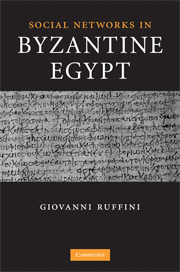Refine search
Actions for selected content:
23990 results in Ancient history
4 - Origen and his ascetic legacy
-
- Book:
- Asceticism in the Graeco-Roman World
- Published online:
- 22 January 2010
- Print publication:
- 02 July 2009, pp 100-130
-
- Chapter
- Export citation
Frontmatter
-
- Book:
- Asceticism in the Graeco-Roman World
- Published online:
- 22 January 2010
- Print publication:
- 02 July 2009, pp i-viii
-
- Chapter
- Export citation
Acknowledgements
-
- Book:
- Asceticism in the Graeco-Roman World
- Published online:
- 22 January 2010
- Print publication:
- 02 July 2009, pp x-x
-
- Chapter
- Export citation
Index
-
- Book:
- Asceticism in the Graeco-Roman World
- Published online:
- 22 January 2010
- Print publication:
- 02 July 2009, pp 177-182
-
- Chapter
- Export citation
Final Thoughts
-
- Book:
- Asceticism in the Graeco-Roman World
- Published online:
- 22 January 2010
- Print publication:
- 02 July 2009, pp 156-157
-
- Chapter
- Export citation
3 - Christian asceticism before Origen
-
- Book:
- Asceticism in the Graeco-Roman World
- Published online:
- 22 January 2010
- Print publication:
- 02 July 2009, pp 58-99
-
- Chapter
- Export citation
Abbreviations
-
- Book:
- Asceticism in the Graeco-Roman World
- Published online:
- 22 January 2010
- Print publication:
- 02 July 2009, pp xi-xii
-
- Chapter
- Export citation

Social Networks in Byzantine Egypt
-
- Published online:
- 26 June 2009
- Print publication:
- 20 November 2008
8 - Rule by one revisited: the politics of Xenophon, Plato, Isocrates, Aristotle – and Alexander the Great, c. 400–330 BCE
-
- Book:
- Ancient Greek Political Thought in Practice
- Published online:
- 05 June 2012
- Print publication:
- 28 May 2009, pp 96-106
-
- Chapter
- Export citation
4 - Rule by some: the politics of Solon, c. 600 BCE
-
- Book:
- Ancient Greek Political Thought in Practice
- Published online:
- 05 June 2012
- Print publication:
- 28 May 2009, pp 46-54
-
- Chapter
- Export citation
Preface
-
- Book:
- Ancient Greek Political Thought in Practice
- Published online:
- 05 June 2012
- Print publication:
- 28 May 2009, pp xi-xiv
-
- Chapter
- Export citation
Narrative V - The Hellenistic Greek world, c. 300–30 BCE
-
- Book:
- Ancient Greek Political Thought in Practice
- Published online:
- 05 June 2012
- Print publication:
- 28 May 2009, pp 107-109
-
- Chapter
- Export citation
Index
-
- Book:
- Ancient Greek Political Thought in Practice
- Published online:
- 05 June 2012
- Print publication:
- 28 May 2009, pp 164-169
-
- Chapter
- Export citation
Bibliographical essay
-
- Book:
- Ancient Greek Political Thought in Practice
- Published online:
- 05 June 2012
- Print publication:
- 28 May 2009, pp 143-147
-
- Chapter
- Export citation
Contents
-
- Book:
- Ancient Greek Political Thought in Practice
- Published online:
- 05 June 2012
- Print publication:
- 28 May 2009, pp ix-x
-
- Chapter
- Export citation
2 - The Greek invention of the polis, of politics and of the political
-
- Book:
- Ancient Greek Political Thought in Practice
- Published online:
- 05 June 2012
- Print publication:
- 28 May 2009, pp 11-24
-
- Chapter
- Export citation
Narrative I - The prehistoric and protohistoric Greek world, c. 1300–750 BCE
-
- Book:
- Ancient Greek Political Thought in Practice
- Published online:
- 05 June 2012
- Print publication:
- 28 May 2009, pp 25-28
-
- Chapter
- Export citation
Narrative II - The archaic Greek world, c. 750–500 BCE
-
- Book:
- Ancient Greek Political Thought in Practice
- Published online:
- 05 June 2012
- Print publication:
- 28 May 2009, pp 41-45
-
- Chapter
- Export citation
APPENDIX II - The ‘Old Oligarch’: a close reading
-
- Book:
- Ancient Greek Political Thought in Practice
- Published online:
- 05 June 2012
- Print publication:
- 28 May 2009, pp 140-142
-
- Chapter
- Export citation
10 - The end of politics? The world of Plutarch, c. CE 100
-
- Book:
- Ancient Greek Political Thought in Practice
- Published online:
- 05 June 2012
- Print publication:
- 28 May 2009, pp 124-130
-
- Chapter
- Export citation
